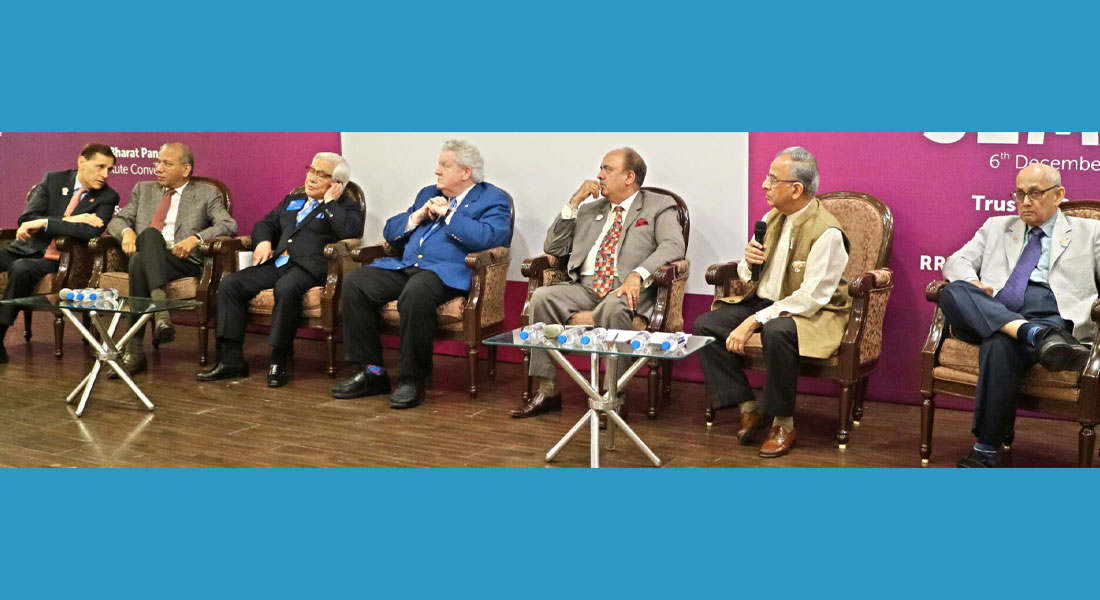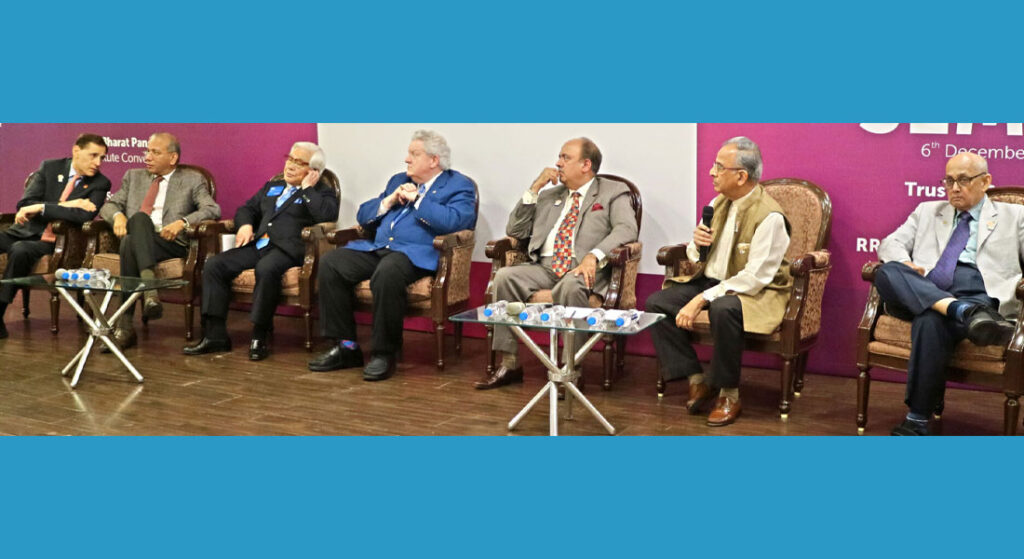
One of the very lively and peppy sessions at the Indore Institute, where you could palpably witness audience participation, engagement and plenty of animated cross exchanges was the panel discussion on ‘Grants and Stewardship’ at the TRF seminar chaired and moderated by TRF Trustee Gulam Vahanvaty.
Incoming Trustee Chair PRIP K R Ravindran, who was on the panel, laid stress on both sustainability and stewardship in doing service projects with TRF grants. Giving an example, he said that domestics couldn’t really be blamed if the employer left money and other valuables lying around within easy reach, or a driver was entrusted with shopping for the house without proper accounts being maintained. “You will lose money because of your carelessness and may end up even sacking that domestic or the driver.”
Similarly, when projects go wrong, Rotarians, who were of course responsible, were blamed but “I would put the bigger responsibility on the DRFC and even the DG. No project is done without the DRFC’s signature, and the DG needs to know what projects are going on in his district.” He is responsible for the money given by his Rotarians and the public. “Both the DG and the DRFC have the responsibility to ensure that money is correctly spent and the DRFC has to ensure the reports are correct.”

His message was very clear: “I am saying DGs who get credit for raising big money also have the responsibility to see that money is correctly spent; otherwise not only their, but also our,credibility is at stake.”
Another panellist, PRID Manoj Desai, who chairs the Rotary Technical Cadre, explained its role: “We are a group of 700 advisors who have volunteered to give our time and expertise to TRF. They are a silent team but give rock-solid support to TRF.” India has the largest number at 90 members and a first ever seminar to train them will be held in March and 50 have registered.
“They urge Rotarians to plan and execute large and strong projects; many districts consider them TRF policemen!”
Describing him an “anti-money-laundering expert”, Vahanvaty asked Rajesh Anand from RISAO to talk about stewardship issues in TRF grants. Anand disclosed that the original stewardship assignment was the brain child of the present RI President Mark Maloney and past Trustee Chair Bob Stewart. Stewardship issues crop up “due to lack of project planning and an overdrive. This is a challenge observed frequently where there is no community assessment,” he said. “Also, encourage MoUs with the beneficiary organisations, as they should be responsible for maintenance.”
Ravindran said another major factor in grant approval was the relevance of the project, along with its sustainability. Sometimes the funds were used properly, all bills paid, and there was no misuse. But after completion it was found the project was not as useful as envisaged because the project planning wasn’t sufficient to meet local needs. As an example he gave instances of “putting up hand wash stations in schools with no water supply, or a toilet where the drainage water was not free flowing, so the children stopped using it; or giving benches to a school which could not conduct classes due to the absence of teachers.”

He said that in a project to eliminate cervical cancer from Sri Lanka, while putting up a DNA testing machine with TRF money, “which would replace the Pap smear that women hate, we got assurance from the government that after the first set of consumables (included in the TRF grant) runs out, the government would replace them. Or else, there was no point in doing that project.” He made the point that unless the goverment furnished them with a guarantee that consumables would be covered in its health budget, Rotarians would not pursue with the project.
Ravindran added: “So essentially, you must satisfy yourself that your project is doing what it needs to do, or else don’t do it.”
RIPN Mehta raised some critical issues of relevance to India with regard to approvals of TRF Global grant applications. That this was a problem facing several Rotarians was evident when others from the audience raised issues connected with global grants. Some were of the opinion that TRF was not being proactive to the applications from India, especially this being its centenary year.
Mehta said that as Rotary celebrates 100 years in India, Rotarians in the zone are really excited about doing “bigger and bolder projects”. He reiterated that a better understanding is required of the needs and situations in India. “One size doesn’t fit all, it was said, and similarly one mistake is not carried out in all projects. We do half the number of projects in the world. Rotarians in our zones are doing great work,” he said.
If Rotarians needed a better understanding of how to do needs assessment, he had already discussed with Trustee Vahanvaty that a seminar can be held to explain the finer aspects of need assessment. But disapproval of several TRF grant applications is bound to dampen the spirit of Rotarians, he added.
This was particularly relevant in a year Rotary in India celebrates its 100th birthday, “which will not come again next year”, and when the present batch of DGs have committed to doing service projects worth a whopping $350 million, he added.
(Ravindran explained to Rotary News later that in some cases there was a philosophical difference in the ways the Trustees of TRF thought and the queries raised by Rotarians connected to service projects. For instance, Trustee thinking is that where ten toilets are necessary in a school, it will not sanction one toilet as it does not satisfy the needs assessment and Rotarians’ funds would be better spent elsewhere in more needy areas. “On the other hand, there is an opposing view that one toilet is better than no toilet! This is a decision that only the Board of Trustees can consider and make. It is not within the domain of staff to make that exception.”)
Trustee Vahanvaty added: “We need to iron out these issues within the policies and guidelines of TRF. Where we need to make some adjustments, we will go back to the Trustees.”
He said, “We have got GGs sanctioned worth $21.5 million; the second country, Taiwan, has got $4.5 million. This is just to put it in perspective; it doesnt undermine what you’ve said.”
On the other hand, a couple of voices were raised supporting the quick approval of grants and leading them was PRIP Rajendra Saboo, who said, “My experience is that the staff in Evanston is very helpful; where there is deficiency, they point it out, and even reduce the processing time once the urgency of the project is established.”
Proving that as an organisation TRF and RI leadership do respond to the concerns raised by Rotarians, Trustee Chair Elect K R Ravindran, after consulting RI General Secretary John Hewko, who was seated on the dais, made a statement that was received with an appreciative applause. He said: “I promise you that within the next three months, I will personally go into the issues you have raised and give a report to Vahanvaty. We will do an assessment of the number of applications that have come from you, the number that have been turned down, how many have been approved and the total amount of money spent.”

Added a smiling Vahanvaty: “So you can see, we are proactive. None of us want us to be blocks. If we don’t dish out grants, we’re losing the raison d’etre for which TRF was formed.”
Added John Hewko, “I don’t have immediate answers to the concerns you are raising… but it was very helpful to attend this discussion because obviously there is an issue in India in relation to global grants.” He promised to gain “a better understanding” and find out if the rejection of grants in India was higher compared to other regions.
Disclosing an important number, he said that “90 per cent of GGs get approved, worldwide, but if the approval rate in India is 50 per cent — I don’t know what it is — I will find out why. I have been discussing with Ravindran here and we need to look into the reason but I have given clear instructions to the staff when they review GGs, their role is to get to a ‘yes’ and not a ‘no’. Their job is to do everything possible to approve and not disapprove it.”
(Ravindran later told Rotary News that the world acceptance rate of global grant applications was 90 per cent and in our zones 89 per cent in the first half last year. In the second half, the world acceptance rate was 83 per cent; the figure in our zones was 78 per cent.)
Hewko assured the Rotarians that he would get to the bottom of the matter as “enough dust has been thrown up here” and added that while currently most of the work on grant applications was being done in Evanston, “our long term philosophical approach and instructions to the team are to start preparing to push approval and closing functions out of Evanston to the regional offices. Closer to the time zones there will be a better realisation of the needs and the realities there; that is the long-term strategy.”
But the flip side of “pushing decision making authority to the regional offices is that there have been instances of extraordinary pressure being put by senior leaders and other Rotarians on the staff, making it very hard for them to objectively implement Trustee policies. Staff does not make policy, we only implement what the Trustees have asked us to do,” he added.
The lively session closed on a positive note when one of the delegates spoke in glowing terms about the prompt attention his applications had received, the helpfulness of the RI staff, and a 100 per cent approval of all their applications.
Pictures by Rasheeda Bhagat








